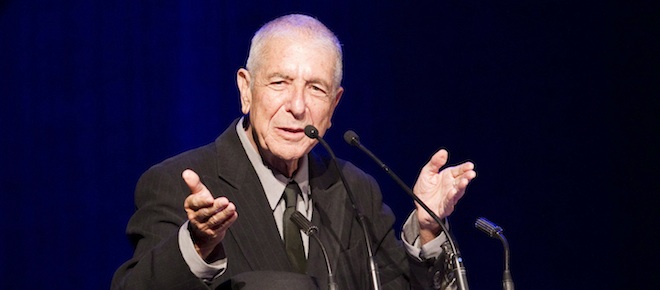Leonard Cohen honoured as ninth laureate of the Glenn Gould Prize
John Prine, Cowboy Junkies, Michael Ondaatje, Adrienne Clarkson, and Alan Rickman paid tribute to the bard
Leonard Cohen acknowledges the audience after receiving the Glenn Gould Prize in Toronto on Monday May 14, 2012. Cohen is the ninth recipient of the $50,000 prize, awarded for unique lifetime contribution to the arts. THE CANADIAN PRESS/Chris Young
Share

A slight figure in a grey suit with one hand clasped to his chest came on stage last night to greet a full house at Massey Hall, where he was receiving the $50,000 Glenn Gould Prize for a lifetime of achievement in the arts.
“My remarks will be mercifully short,” Leonard Cohen began, “because I want to hear the music.” And no wonder: the line-up waiting to honour Cohen included John Prine, the Cowboy Junkies, Serena Ryder, Blue Rodeo’s Greg Keelor, and Cohen’s son Adam, with spoken tributes by Michael Ondaatje, Adrienne Clarkson, Melissa Auf Der Maur and Alan Rickman. Closing Time was a long ways off.
Then Cohen described one of his own encounters with the world’s greatest classical pianist.
Early in his career, he managed to wangle a magazine interview with Glenn Gould. The two met, started to talk, and Cohen “began scribbling away”. The conversation deepened, Cohen abandoned his notes, and several intricate, rich hours went by. “I felt the words were embedded in my soul,” said Cohen.
“Then I got back to my little room on Mountain St. in Montreal, ready to write the story, and I couldn’t remember a thing.” He spent the next few weeks avoiding phone calls from the editor. The article never appeared.
Leonard Cohen, Failed Journalist. Who knew?
One of the many things we can thank Leonard for (we’re all on a first name basis with him) is the tone he establishes at events like these. It could have been a stuffy evening of long-winded speeches. But Leonard always cuts to the chase, keeping his remarks personal, lighthearted and modest. He is also generous, donating his prize money to the Canada Council for the Arts.
That set the tone for an evening that, apart from a few musical dips, was magical, brimming with affection for the man, the poet and the musician. Sitting in the balcony behind a funny little swag of blue bunting like royalty, Leonard gave every appearance of enjoying himself, doffing his fedora to the performers. Early on, he also let the musicians off the hook, saying “Please don’t be nervous about playing for me— I tend to go into paroxysms of gratitude whenever I hear anyone singing a song of mine.”
Greg Keelor of Blue Rodeo took him at his word, and immediately fluffed a few lines in his otherwise wonderful version, backed by Travis Good of The Sadies, of “Famous Blue Raincoat”.
Other musical highlights included Cohen’s musical collaborater Anjani Thomas. In a blush-coloured silk blouse, still and slim as a flute of wine, Anjani brought a poet’s economy to the way she sang “Crazy to Love You”, from the new album “Old Ideas”. At the opposite end of the spectrum was the rough, true timbre of John Prine who did himself proud on the hard-to-sing “Bird on a Wire”. Author Michael Ondaatje spoke about how important Cohen’s first novel, “The Favourite Game” was to him as a writer. Newly arrived from England, Ondaatje noticed that books and films were always set elsewhere, never in Canada. “But that book, and its main characters Breavman and Krantz, mapped Montreal for me”, he said, going on to read a hilarious passage from the 1963 novel about the dullness of the Canadian prime minister. (A timeless theme, evidently.)
The musical highlight of the evening for me was Serena Ryder. Her big, joyful voice and her attack on the guitar turned the normally delicate composition “Sisters of Mercy” into a full-blooded raunchy version of the song. It was about time in the evening for something sexy, too.
Matching Cohen in the voices-from-the-bottom-of-the-sea department was actor Alan Rickman, who delivered the most gorgeous reading of the evening. The bite, the wit and the unflinchingness of Cohen’s poetry was all there in Rickman’s exquisite rendering.
The night ended with Cohen’s 39 year old son Adam playing guitar, singing – and coaxing the audience to sing along too – on “So Long Marianne”. Several decades back, when many considered Leonard Cohen’s voice a joke and his writing too gloomy, the Montreal folksinger wrote this little break-up song with its strangely cheerful chorus, urging us to laugh and cry and cry and laugh about it all again.
Now here was his grown son and a concert hall full of fans, singing it back to him.
I hope he still likes the song!
All of this unfolded in the aging but still resonant Massey Hall – the Leonard Cohen of venues. As another Canadian songwriter might put it, long may they both run